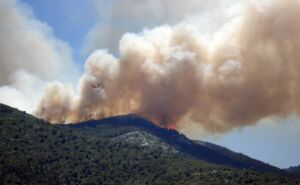Wildfire Season Off to an Early Start: How You Can Be Better Prepared

By Kellie Hale
April showers, bring May flowers is the usual saying. However, now it seems that April fires will bring an early start to wildfire season. During the week of April 19, Washington has seen a reported 91 wildfires total. Again, that was all in one week. If we are already having wildfires in spring, then what does that mean for summer? What can we expect?
“This year is already heating up,” said Commissioner of Public Lands, Hilary Franz in a Facebook post back in April, “We have already been out on a number of wildfires here in Washington, and it’s only April…More than ever, we need consistent and reliable funding to reduce these catastrophic wildfires, save our communities and lives and prevent the Evergreen State turning charcoal black.” The increase in wildfires is a real threat with no signs of slowing down. Fires will continue to begin early and last longer. Hot and dry weather, along with gusty winds, pose a real threat to the continued rise in wildfires across Washington State.
“It’s never too early to start preparing your yard and home,” Franz said in another Facebook post. She has been pushing the state legislature for more funding on combating wildfires as the seasons become drier and more damaging to property, land, and lives. Thankfully, there are ways for people to prepare their homes for wildfires. By creating a 30 to 100-foot safety zone around one’s property, there are steps to take to help reduce potential exposure to possible flames and heat. Contacting the local fire department in your areas or forestry office can help provide additional information on preparing your home for wildfires. Remember, wildfires can begin unnoticed and can be triggered by mere accidents. Fire can spread quickly and rapidly, destroying everything it touches.
Ways to help keep your home safe:
Collect dead limb and twigs, rake leaves and clear out all flammable vegetation.
Leaves and rubbish that are hidden or under structures should be removed.
Branches that are dead and extend over the roof of one’s home should be removed.
Take the time to prune trees and shrubs that are within 15 feet of a stovepipe or chimney.
It is okay to ask the power company to come out and clear branches from power lines.
Regularly mow your grass.
Should remove vines from the walls of your home.
Additional information on how you can protect your home from wildfires are here:
https://www.wunderground.com/prepare/wildfire

